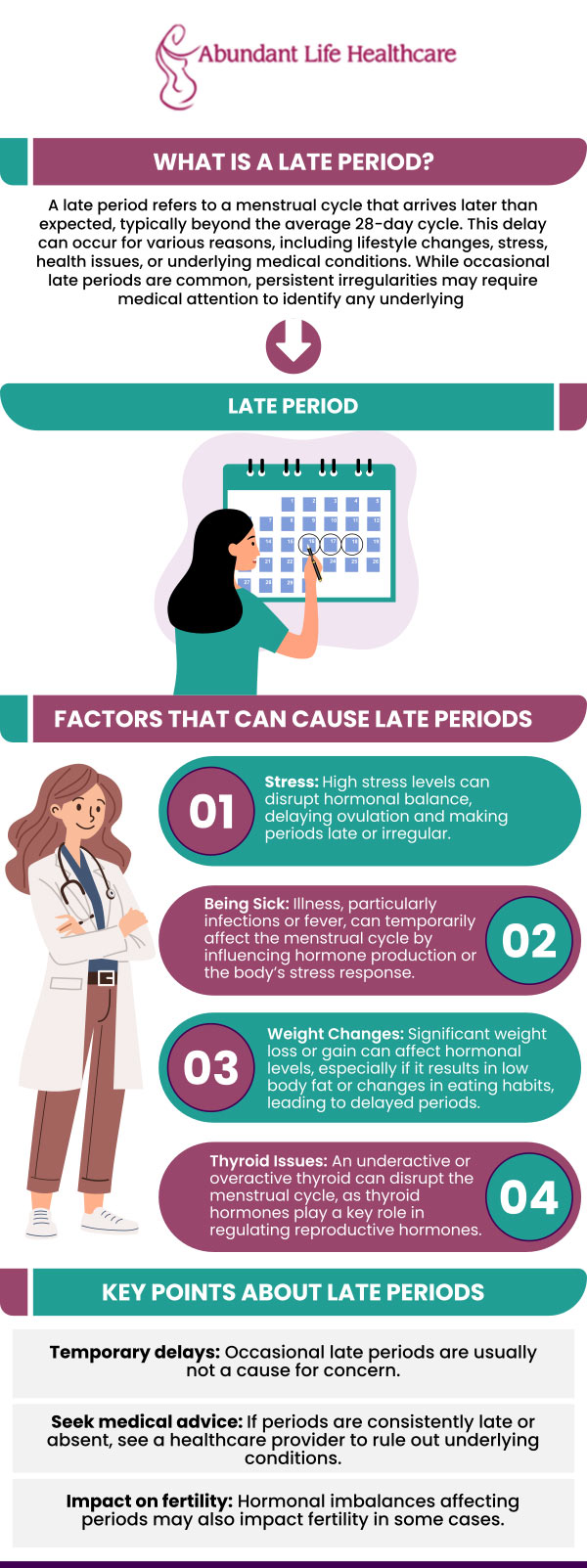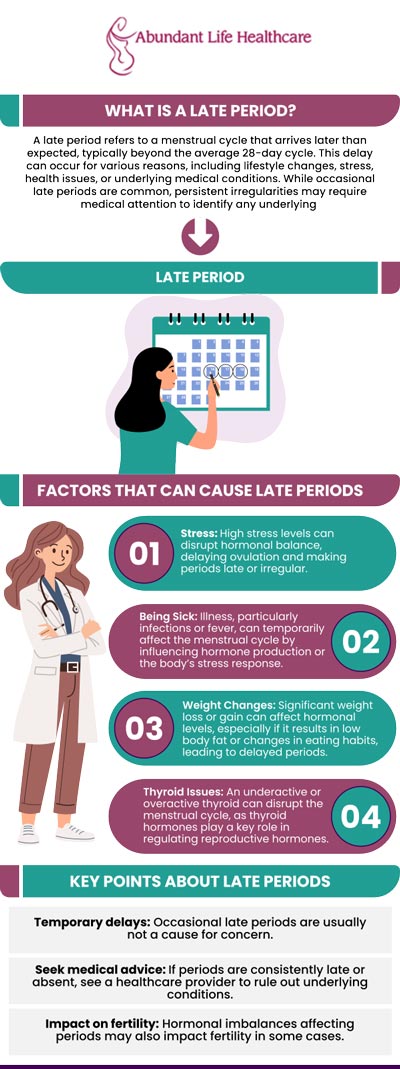What a Late Period Can Tell You About Your Health
A late period is a key indicator of your body’s overall health and can signal more than just pregnancy. Significant changes in weight, extreme stress, or intense athletic training can throw your cycle off balance. If you experience persistent irregularities, consult Dr. Marc Jean-Gilles, DO, FACOG. Our dedicated team helps identify the root cause and recommend a course of action, ensuring your reproductive and overall health are on track. For more information, contact us today or book an appointment online. We are conveniently located at 601A Professional Drive, Suite 370, Lawrenceville, GA 30046.


Table of Contents:
How can hormonal imbalances, like those in PCOS, be identified as the cause of a missed period?
What is the connection between a late period and thyroid health or other endocrine disorders?
Can significant changes in diet or weight, such as in cases of eating disorders, cause a person’s period to stop?
How does perimenopause differ from other causes of a late period, and what are the key symptoms to watch for?
Hormonal imbalances are a common underlying cause of missed periods, with polycystic ovary syndrome (PCOS) being a classic example. Our approach to identifying hormonal imbalances begins with a comprehensive medical history and evaluation by our experienced healthcare professionals. If you have missed a period, our team will discuss the regularity and characteristics of your menstrual cycles, as well as any additional symptoms you may be experiencing—such as excessive hair growth, acne, weight changes, or hair thinning—which can be signs of PCOS or other hormonal issues.
By combining your medical history, symptoms, physical findings, lab results, and imaging studies, our providers can determine whether a hormonal imbalance—such as PCOS—is the likely cause of your missed period. If a hormonal imbalance is identified, we will work with you to develop a personalized treatment plan to help regulate your cycles and address any other symptoms you may be experiencing, supporting your journey to optimal health and well-being.
At Abundant Life Healthcare, we understand that a late or missed period can be concerning and sometimes signals an underlying health issue—especially those related to your endocrine system, which regulates hormone production throughout the body. One common cause of menstrual irregularities is thyroid dysfunction. The thyroid gland, located in the neck, plays a vital role in controlling many body functions, including the menstrual cycle. Both hypothyroidism (an underactive thyroid) and hyperthyroidism (an overactive thyroid) can disrupt the balance of hormones like estrogen and progesterone, leading to irregular cycles or missed periods.
Other endocrine conditions, such as polycystic ovary syndrome (PCOS), are also frequent contributors to menstrual irregularities. PCOS affects hormone levels and can cause missed or infrequent periods, as well as other symptoms like acne or excess hair growth. Disorders of the pituitary or adrenal glands may similarly impact your menstrual health by altering hormone production.
If you’re experiencing a late period and are concerned it may be related to a thyroid condition, PCOS, or another hormonal imbalance, the caring medical team at Abundant Life Healthcare is here to help.Early diagnosis and professional care can make a significant difference in managing symptoms and promoting your overall well-being.
Significant changes in diet or weight—whether intentional or unintentional—can cause your period to stop, a condition known as amenorrhea. This is especially common for individuals struggling with eating disorders like anorexia nervosa or bulimia, but it can also happen with rapid or extreme weight loss from other causes or from excessive exercise combined with inadequate nutrition.
The menstrual cycle relies on a delicate balance of hormones, which can be disrupted by nutritional deficiencies or significant weight changes. For example, low body fat and not eating enough calories can lower the production of key hormones needed for ovulation and menstruation. When this hormonal balance is affected, your body may halt menstrual cycles as a way to conserve energy—a signal that something may not be right.
While this may be your body’s natural response, missing periods for an extended time isn’t healthy. Prolonged amenorrhea can lead to complications such as decreased bone density, infertility, and long-term effects on your heart and metabolism.
If you notice your periods have stopped after significant dietary changes, weight loss, or if you have concerns about disordered eating, we encourage you to reach out. Early evaluation and intervention can prevent long-term complications and help restore your health.
Perimenopause is a natural transitional phase leading up to menopause, often experienced by women in their 40s but sometimes beginning earlier. Many women visit us with concerns about late or missed periods during this time. While perimenopause is a common cause, it’s important to remember that other factors—such as pregnancy, significant stress, thyroid disorders, polycystic ovary syndrome (PCOS), or significant weight changes—can also affect menstrual cycles.
What sets perimenopause apart is that it’s primarily driven by fluctuations and a gradual decline in ovarian hormone production, especially estrogen and progesterone. This hormonal shift leads to irregular menstrual cycles—periods might be late, skipped, or unusually heavy or light, and these patterns can persist for several months or years before menopause (defined as twelve consecutive months without a period) is reached.
How do you know if you’re experiencing perimenopause?
Symptoms that suggest perimenopause include not only irregular periods, but also hot flashes, night sweats, sleep disturbances, mood changes (such as increased irritability or anxiety), vaginal dryness, decreased libido, and sometimes cognitive changes like forgetfulness or trouble concentrating. Experiencing several of these symptoms together, especially in your 40s or early 50s, often points to perimenopause.
However, because many conditions can cause late or missed periods, it’s important to have a thorough evaluation. At Abundant Life Healthcare, we provide compassionate, individualized care to help you understand the cause of your symptoms and ensure your overall health. If your periods become irregular, stop suddenly before age 40, or are accompanied by abnormal bleeding—such as spotting between periods or after sex—we encourage you to schedule an appointment. Our team can help rule out other causes and create a personalized plan to support you through this stage of life.
You don’t have to navigate this transition alone.
Abundant Life Healthcare is here to provide the guidance, support, and care you need to maintain your well-being throughout perimenopause and beyond. For more information, contact us today or book an appointment online. We are conveniently located at 601A Professional Drive, Suite 370, Lawrenceville, GA 30046. We serve patients from Lawrenceville GA, Suwanee GA, Snellville GA, Duluth GA, Dacula GA, Lilburn GA, Loganville GA, Auburn GA, and surrounding areas.
Check Out Our 5 Star Reviews


Additional Services You May Like

Additional Services You May Like
- Obstetrics
- Pregnancy
- Gynecologist
- Birth Control
- Labiaplasty
- Microblading
- Weight Loss
- Semaglutide GLP-1
- Pap Smears
- Pelvic Pain
- Laser Hair Removal
- In House Ultrasound (Including 3D)
- Vaginal Birth After C-Section (VBAC)
- Pregnancy As High Risk
- Multiple Gestations
- Postpartum Counseling
- 24hour/365days On Call Service
- Annual Exam
- Abnormal Uterine Bleeding
- Management Of Endometriosis
- Ultrasound
- Pelvic Organ Prolapse
- Urinary Incontinence
- Perimenopause And Menopause
- Sexual Dysfunction
- Fat Freeze (Like Cool Sculpting)
- Body Contouring
- Ozempic
- Civil Surgeon
- Hormone Replacement Therapy
- Immigration Medicine
- Biote Hormone Pellets
- GLP-1
- Peptide Therapy




